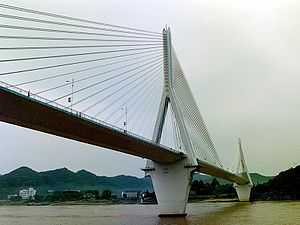Prestressed structure
From Wikipedia, the free encyclopedia
Prestressed structure is the one whose overall integrity, stability and security depend, primarily, on a prestressing. Prestressing means the intentional creation of permanent stresses in a structure for the purpose of improving its performance under various service conditions.[1]
 Today, the concept of prestressed structure is widely employed in design of buildings, underground structures, TV towers, power stations, floating storage and offshore facilities, nuclear reactor vessels, and numerous kinds of bridge systems.[2]
Today, the concept of prestressed structure is widely employed in design of buildings, underground structures, TV towers, power stations, floating storage and offshore facilities, nuclear reactor vessels, and numerous kinds of bridge systems.[2]

Naturally precompressed exterior wall of Colosseum, Rome
There are the following basic types of prestressing:
- Precompression (mostly, with the own weight of a structure)
- Pretensioning with high-strength embedded tendons
- Post-tensioning with high-strength bonded or unbonded tendons

Cable-stayed prestressed concrete bridge over Yangtze river
The idea of prestressing was, apparently, familiar to the ancient Rome architects; the tall attic wall of the Colosseum works as a stabilizing device for the wall piers beneath.
References
This article is issued from Wikipedia. The text is available under the Creative Commons Attribution/Share Alike; additional terms may apply for the media files.